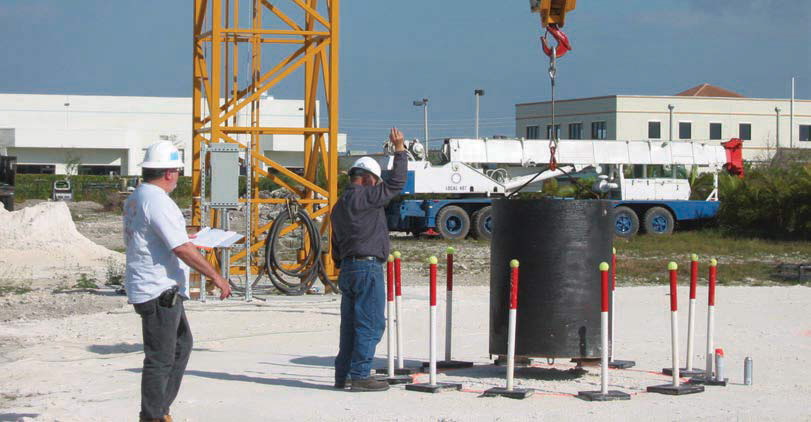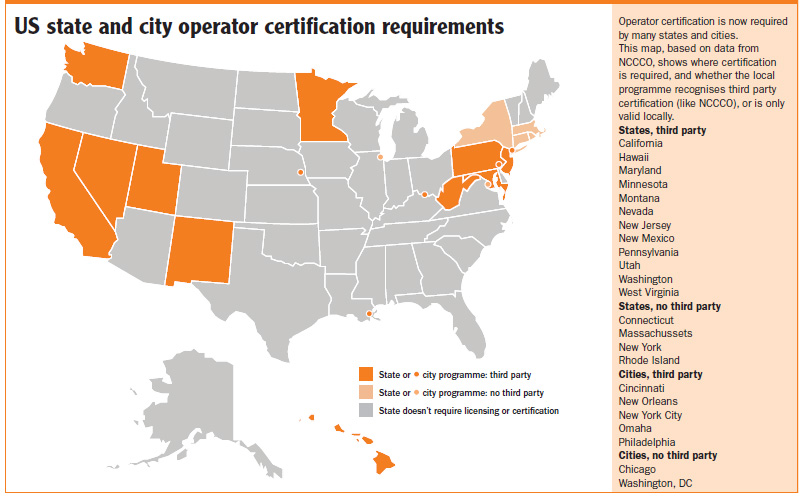US certification on the way?
18 September 2018At long last a nationwide mandatory certification requirement for crane operators in the US may be about to happen. Federal OSHA seems poised to make an announcement soon. Amid uncertainty and delay the NCCCO’s industry-led scheme has for years been filling the gap. Julian Champkin spoke to Graham Brent, CEO of the NCCCO and former editor of this magazine.
The saga of crane certification and qualification in the USA began long ago. “It has been a 25-year-long process,” says Graham Brent. Nor is it over yet. “As we speak [in late July], we still wait for the final word to come down from OSHA.”
The US crane industry had long been lobbying for a basic certification requirement to demonstrate operator competence. Back in 2003, OSHA, the federal Occupational Safety and Health Administration, announced that it would bring in such a rule. More than six years later, in 2010, the OSHA proposals were published. Two aspects proved contentious to the point of unworkability.
“This was the first time ever that there was a cogent effort towards nationwide certification,” says Graham Brent; “But as soon as it was published, there were two issues which were very concerning.”
“The first was a provision that crane operators should be certified by capacity of crane as well as by type,” says Brent. “That was never the intention of the committee that wrote the rule.”
OSHA also took the position that certification was equivalent to qualification, which he says almost everyone, including the certifying bodies themselves, believed was a mistake.”
Certification (an independent evaluation of an individual’s competence) and qualification (which takes into account such factors as experience, physical qualification, crane configuration and working environment) are two different things, he says, and two separate considerations.
“Hardly anyone in the industry wanted the rule the way it was written. The feeling has been that a bad rule is worse than no rule at all.”
Those issues have dogged compulsory certification ever since and have accounted, in part, for the extraordinary delay in implementing a nationwide requirement. “Since then we have really been in limbo,” says Brent.
But there may be hope. After years of delay and deadlock, Brent believes the time may have come when things start to move towards realisation. “Now we are at a cusp,” he says. OSHA has at last agreed to change its stance.
Still, though, bureaucratic processes grind slowly. “They say they will make the changes by rule making; they will fine-tune the language in the rule that they have composed and that is in the OSHA revision stage. The original deadline for the rule as written is still November 2018; but we think that OSHA will now put out a stay directive to not enforce it,” says Brent. The revised version would then become effective some time next year, 2019.
Industry ownership
It will not be the first time that OSHA has put a stay on the process. “It will be their third extension. I think they will need it,” he says.
When the latest version of the OSHA scheme is announced, who is responsible for certification, and who for qualification, may at last be resolved. “In general, most in the industry support continuing to make the employer ultimately responsible for qualification—as well as training—but not for certification.”
“When a prospective employee comes looking for a job, the employer cannot know just from his certification how experienced that guy is, nor how medically fit—the certification body is not a medical expert. But we do know whether or not he has the knowledge and skill to do the job, and that is what certification is about.”
In the absence of a federal certification requirement, an industryled one has been operating for some years. “We at NCCCO started certifying in 1996,” says Brent. “Our scheme took the heat out of OSHA’s proposals to develop its own programme. As long as the private sector abide by certain rules, it can work.
“The market has moved on since those early days. Now, in many places, if you don’t have a NCCCO card, you don’t work. In place of OSHA doing it, the industry elected to do it themselves.”
“Our programme started as a voluntary scheme. Then it became accredited, then formally recognised by federal OHSA, and then adopted across the industry. The idea was that it would be developed by the industry, for the industry.”
And, he says, it has worked. “Our twentieth anniversary was two years ago, and in those twenty years there has been a huge improvement.
Anyone would tell you that. Accident rates have dropped, insurance rates have gone down; across the board people realise that as long as the rules are obeyed it can work as an immensely valuable component of the qualification process.”
“OSHA’s request for a six-month extension before the requirement becomes effective takes us to April next year. In the meantime we are certifying people at a greater rate than ever. We have 28 categories of certifications now, and over 300,000 certifications have been issued.” “Sixteen states require some sort of licensing or certification of crane operators and NCCCO certification is recognised in most of them.
“The largest is California, where we have 18,000 operators with certification. Texas comes next in terms of numbers—its oil industry means that there are about the same number of cranes there—but in Texas certification is not required by the state, although the industry has driven its adoption there.”
“At NCCCO we see on our system thirty or forty new job postings for crane operators each day, all of them requiring NCCCO certification. Risk management is what is driving it. Insurers know that it is in their interests. Once we got the insurers onboard they acted as ambassadors for our programme. They could see the advantage to them.
“Our programme does not make the OSHA initiative irrelevant; it just means that we are getting on and doing it anyway. There are always people who will not do anything until they are forced to. The OSHA requirement when it comes in will capture them, and force them to get certified. We don’t know how many of them there are.”
A tight deadline
When OSHA does announce and bring in its requirement, Brent suspects it will not give much notice. “Not two or three years; more likely they will give two or three months for operators to get in line” he says. So there will be a rush for certification.
“We think we can handle that volume. We managed it in California when our scheme became mandatory there in 2010. But it will be a challenge, and if I were a crane operator I would not want to be in that position, of scrambling to get certified before time runs out. So, we are encouraging operators to get themselves certified now.” To that end he points to the NCCCO website, at www.nccco.org/ dontwait, where encouragement and instruction to that end is given.
As with ESTA in Europe, Brent stresses that NCCCO does not itself carry out the training component of qualification.
“We don’t do the training, we provide the assessment test. The core exam takes 90 minutes. There is a one-hour special exam; there is no time limit on the practical exam but it generally takes between 45 minutes and an hour.”
“Sometimes the individual pays, sometimes the employer, sometimes the labour union. One of the rethinks that OSHA is contemplating in their requirement is a rule that the employer must pay.”
Whoever ends up paying it, the cost of certification is considerably less than in Europe: “For certification in one category of crane the cost is $250. That is low, and deliberately so. It has not changed since 2000, and I don’t know of very much else that has not increased in price since then. The intention was to ensure that it is affordable. At that time individuals were mostly paying for it themselves, and the benchmark we took was that it should cost no more than the price of a good pair of work boots. That was our thinking, and we try to keep to that today.”
Quite when OSHA will bring in its requirement is still unresolved; but Brent believes it will happen sometime during the next six months.
“Watch this space” he says. “We will hear something from OSHA in that time.
“In spring, things will happen.” And he ends with a repeat of his call to those crane operators who have yet to get themselves certified: “Do it now. Step up! Don’t wait for the big rush!

